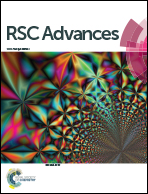Degradation and nano-patterning of ferroelectric P(VDF-TrFE) thin films with electron irradiation†
Abstract
P(VDF-TrFE) nanofilm is a critical component in many organic electronics. Here we report the irreversible degradation of its ferroelectricity due to medium-energy electron irradiation (<10 keV), which is commonly found in device fabrication and characterization tools. The first-order electromechanical coupling in P(VDF-TrFE) was directly measured by atomic force microscopy to study the ferroelectricity switching property. Results showed that P(VDF-TrFE) films became non-ferroelectric after metal deposition in an electron-beam evaporator or after two minutes of observation under a scanning electron microscope. Lowering the electron energy slowed down the degradation process, but 500 eV electrons were still detrimental to the film. Irradiation is believed to transform the all-trans polar phase of P(VDF-TrFE) into a non-polar state, as revealed by infrared spectroscopy. On the other hand, controlled electron irradiation allows us to create patterns on the ferroelectric P(VDF-TrFE) thin films at submicron spatial resolution.


 Please wait while we load your content...
Please wait while we load your content...